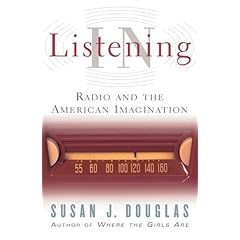College radio or shall I say, pure student radio
News story from today's issue of the Chronicle of Higher Education:
Turning Campus Radio on Its Head
Podcasts and Web streaming widen college radio's reach, but some stations worry about becoming too mainstream
Brock Read profiles the world of college student radio, where independent music still lives and wackiness usually ensues. He writes about the new technological developments of podcasting and streaming which have help spread its programming far away from the campus from which it originated. Interaction now happens at a scary pace, especially with our AOL Instant Messenger window. Imagine a window popping up on the computer screen saying, "You guys suck" five seconds before you have to go on-air. I developed a pretty tough skin very quickly. And no, I'm not going to play Nick Drake for you again. LOL.
Student radio...ah, good times. I remember the two years I had on air at WIUS with my roots show, The Kitchen Party.
I found volunteering at the station to be a good overall experience. We were required to be on one committee, which only took up an hour or two a week in addition to prepping and hosting my show. Most of the time I spent on the Production Committee where we wrote, voiced, recorded, and edited public service announcements, imaginary commercials, and some underwriting credits. It was fun, because I got to use my creativity and write what a college student might find entertaining. Sometimes it was long-form, sometimes pithy. These announcements were usually written for particular voices on the committee in mind. People wrote for me when they had a public radio voice in mind--it's close and untrained, but that's the cadences and tone I've picked up most. We had some funny people writing and voicing those announcements: some natural comedians and others that needed to come out of their shell a bit more.
One semester I volunteered for the Engineering Committee. It was a valuable experience. I learned a lot about gear: mixing boards, cables, microphones, and fixing stuff. I had nightmares about industrial arts class when I was told we'd be soldering cable at one of our meetings (cable to RCA connectors). Most of the volunteers were in the Audio program at IU, but our committee head was gracious and helpful enough to teach me about radio and equipment.
Being on-air gave me experience about being "natural" on-air. You learn how to think on your feet (or on your seat, in most cases). You also learn about the pressures of time and the clock. We were required to play announcements and give a weather reading at certain points of an hour. According to Wikipedia, a format clock is "a diagram produced by a programme director or a producer to illustrate where each programming element appears in a typical hour." Our clock was pretty loose. We were required to play one promo around 20 minutes, one underwriting credit about 30 minutes, and weather on the 40. This was not absolute, but I tried to stick to the requirements as much as I could. You had to remember to play these from another computer which was tied into the board.
The first year I broadcast I structured my shows very tight. Since I was only one of two folk DJs, I had to make sure that product was coming into the station for me to play. I had to review CDs, do cold-call e-mails to artists and labels, and report back what I played (or at least put my playlists on the FOLK-DJ listserve).
Volunteering for WIUS was quite different from my work at WETA and WFIU. At the public radio stations I was a staff member, and it was almost all behind-the-scenes. I had assigned duties and I stuck to them, while being occassionally asked to voice something special. I like being behind-the-scenes: whether it's cataloging, acquiring new CDs, or researching for producers or announcers; but it really drove home to me that these tasks have to be for the benefit of the people who are on-air. Radio stations are not libraries. Yes, they should be paying attention to their historical archival material, but often they are no-frills operations.
Filed under: radio









